In Japanese, okaeri おかえり, meaning literally "return," is an expression used when welcoming someone back home from school, work, etc., specially after the person coming back home says tadaima ただいま. Longer variants include okaerinasai おかえりなさい, okaerinasaimase おかえりなさいませ, okaerinasaimashi おかえりなさいまし. They're also spelled お帰り, お帰りなさい, お帰りなさいませ, お帰りなさいまし.
When leaving home, ittekimasu 行ってきます and itterashai 行ってらっしゃい are used instead.
Meaning
The full version of okaeri, okaerinasai, would be:
- youkoso okaeri nasaimashita
ようこそお帰りなさいました(detail.chiebukuro.yahoo.co.jp)
Well done having returned.
The word youkoso ようこそ is often used when welcoming people to places in general. It comes from yoku zo よくぞ, which commends someone for doing something, e.g.: "well done" coming here.
The phrase okaeri nasaimashita is a bit complicated.
The important verb is kaeru 帰る, "to return home."
The phrase kaerinasai 帰りなさい is a ~nasai ~なさい imperative, and would be ordering someone to "go home," but this is irrelevant here.
The verb nasaru なさる means "to do." Its polite ~masu ~ます form isn't nasarimasu but nasaimasu なさいます, due to i-onbin イ音便. The ~mashita ~ました morpheme is the past form of ~masu.
Together with the honorific prefix o~ お~, the pattern o-verb in renkyoukei 連用形 form-nasaimasu would refer to the fact that someone has done an action.:
- okaeri nasaimashita
おかえりなさいました
[He] did the returning. (literally.) - kaetta
帰った
[He] returned.
Examples
For reference, some examples:
- Context: a father comes back home, is greeted by wife and daighter.
- papa, okaerii
パパ おかえりー
Daddy, welcome back home.
- Context: Minami Kana 南夏奈 welcomes home her younger sister, Minami Chiaki 南千秋.
- tadaima
ただいま
[I'm back]. - okaeri
おかえり
[Welcome back]. - tteiuka, are da na
っていうかアレだな
[Or rather], [it] is that.- are da - "[it] is that," as in "you know, it's that thing when, which, etc.," used like this to refer to an idea the speaker assumes to be known already, and will remind the listener of next.
- omae wa hayaku kaette watashi no asobi-aite wo suru beki da
おまえは早く帰って私の遊び相手をするべきだ
You should return home quickly and be my play-partner.
You should come home quickly to play with me.- Kana reminds Chiaki of what she should do.
- konna jikan made doko hottsuki-aruiteta-n-da, kono yarou
こんな時間までどこほっつき歩いてたんだこの野郎
Where were [you] loitering around until this [late], you bastard?- konna jikan made - until this hour, until this late.
- ~teta-n-da - contraction of ~te-ita no da ~ていたのだ.
- Context: Yukimoto Yuzu 雪本柚子 imagines herself as a bride who would support her future husband.
- okaerinasai anata ♡
おかえりなさいあなた♡
[Welcome home, dear.]- anata
あなた
You. (second person pronoun.)
Sometimes used by a wife to refer to her husband.
- anata
- ofuro ni suru?
gohan ni suru?
soretomo... wa... ta... shi...?
お風呂にする?
ご飯にする?
それとも・・・わ♡た♡し♡??
[What do you want to do]?
[Eat]? [Take a] bath? Or... me?- This is a meme called shinkon santaku 新婚三択, "newly-wed three choices."
- soretomo watashi
それとも私
Or me. (often pronounced with a suggestive pause.) - gohan means a "meal," and can be "lunch" or "dinner." It's normally dinner since the scenario is usually about a husband coming home from work.
- ni suru にする, in this case, means to settle on doing something, to choose a choice, to decide on plans.
- Context: Nyaruko ニャル子 welcomes Yasaka Mahiro 八坂真尋.
- osokatta desu ne
遅かったですね
[It took you a while, huh]. - okaerinasaimashi, Mahiro-san
おかえりなさいまし、真尋さん
Welcome back home, Mahiro-san. - watashi ni shimasu ka?
soretomo saki ni watashi ni shimasu?
soretomo wa... ta... shi?
私にしますか?
それとも先に私にします?
それとも わ・た・し?
[What do you want to do?]
Me? Or, before that, me? Or... me?
Used by Maids
In manga and anime, sometimes you have a "maid," meido メイド, and they'll greet their "master," goshujinsama ご主人さま, with okaerinasaimase.
In particular, there are maid cafés where the staff cosplays as maids and the customers are greeted in this manner as if they were the "master" of a mansion with maids.
- Context: characters enter a maid café.
- okaerinasaimase♡
お帰りなさいませ♡
Welcome back.♡ - goshujinsama~~🎵
ご主人様~~🎵
Master~~🎵- In a maid café, customers are greeted this way, as if they were the maids' masters.
- nikko~~♡
にっこーー♡
*smile* - douzo goshujinsama kochira no seki e♡
どうぞご主人さまこちらの席へ♡
[Please come] to this seat, master.♡- douzo - polite way to say that someone may do or take something, help themselves at something.
- Context: Kobayashi 小林 and Kanna カンナ visit a maid café.
- okaerinasaimase goshujinsama~~!
おかえりなさいませご主人様~~!
Welcome home, master~~! - o~~
おー
Ooh~~ - ando ojousama~~
&お嬢様~
And young lady~~ - o~~
おー
Ooh~~ - {Tooru-sama mitai na} hito ippai!
トール様みたいな人いっぱい!
[There are] a lot of people {like Tohru-sama}.- Tohru is a maid in this series.
Used by Butlers
Similarly, sometimes you have a "butler," shitsuji 執事, instead.
- Context: a guy has a secret.
- okaerinasaimase ojousama
お帰りなさいませお嬢様
Welcome home, young lady. - {shitsuji-kissa de hataraite-iru} koto
執事喫茶で働いていること
[The secret is that] {I work in a butler café.}- This series is about a girl who secretly works in a maid café, but this chapter is a spin-off with genders swapped, so she became a guy who works in a butler café instead.
References
- 帰ってきた人に「お帰りなさい」と言うのは何故ですか? - detail.chiebukuro.yahoo.co.jp, accessed 2021-04-25.
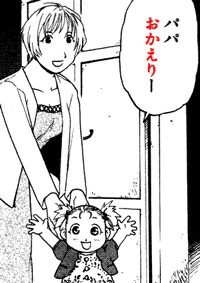
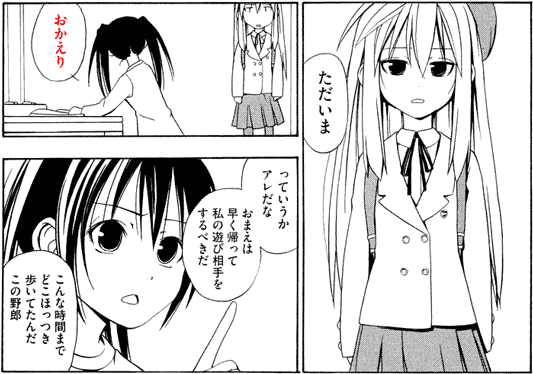
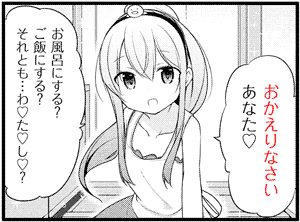
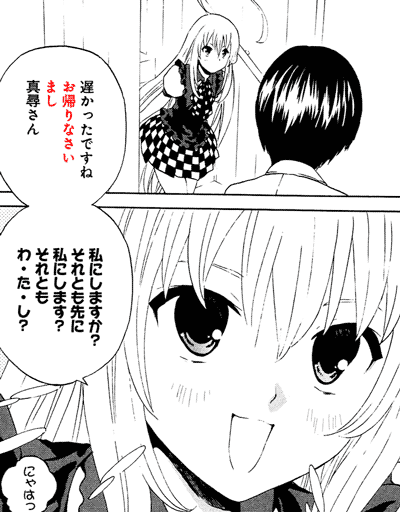

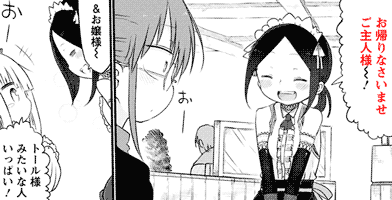
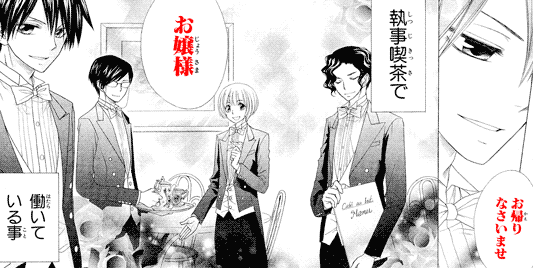
No comments: